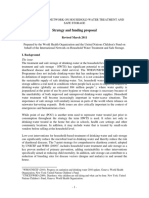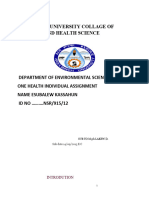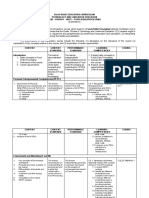Enews Eh
Enews Eh
Uploaded by
dirafqCopyright:
Available Formats
Enews Eh
Enews Eh
Uploaded by
dirafqOriginal Title
Copyright
Available Formats
Share this document
Did you find this document useful?
Is this content inappropriate?
Copyright:
Available Formats
Enews Eh
Enews Eh
Uploaded by
dirafqCopyright:
Available Formats
Issue 61 / January 2014
PUBLISHED BY THE WHO DEPARTMENT OF PUBLIC HEALTH, ENVIRONMENTAL AND SOCIAL DETERMINANTS OF HEALTH (PHE)
Worldwide,
13 million deaths
could be prevented
every year by
making our
environments
healthier
WHO EB discusses public health impacts of
mercury and climate change
The recent WHO Executive Board (EB) discussed the secretariat report on Public health
impacts of exposure to mercury and mercury compounds and the role of the WHO and
ministries of health in the implementation of the Minamata Convention on mercury. The
EB also issued a resolution that will be considered at the May 2014 World Health Assembly: The resolution encourages Member States and requests the WHO DirectorGeneral to take necessary steps with regard to the implementation of the Minamata
Convention and addressing the health aspects of mercury exposure.
The EB also noted the progress report on climate change and health, and Member
States requested WHO to revise and scale up its technical support to Member States,
with a particular focus on strengthening the climate resilience of health systems, and
linking to air pollution. Click here for all EB documentation.
Broadening perspectives beyond the health sector
UPCOMING
EVENTS
2014
> 22 March
World Water Day
> 28-30 April
World Day for Safety
and Health at Work
At the forthcoming Prince Mahidol Award Conference (PMAC), WHO will play a leading
role in the education for health professionals in the environmental and social determinants of health as a critical aspect of transformative learning. Such training can prepare health workers to prevent and treat root causes of disease in their day-to-day clinical practice as well as positioning future health leaders to interact with other sectors,
in support of sustainable development strategies that benefit health. As noted by the
2012 UN Conference on Sustainable Development (UNCSD Rio+20: Health is a precondition for, an outcome of, and an indicator of all three dimensions of sustainable
development. Action on the social and environmental determinants of health, both for
the poor and the vulnerable and the entire population, is important to create inclusive,
equitable, economically productive and healthy societies. The Prince Mahidol Award
Conference is an annual international conference focusing on policy-related health issues of global significance.
International consultation on workers health
Experts will gather in Tehran, Islamic Republic of Iran, from 28 to 30 April for an international consultation: Caring for all working people: Interventions, indicators and service
delivery. Coinciding with the International Day for Health and Safety at Work, the meeting will identify policy options, strategies and mechanisms to scale up workers health
coverage. The objective is to develop criteria and indicators for measuring the access of
workers to interventions for prevention and control of occupational and work-related
diseases and injuries. The meeting is also expected to draw an international road map
and voluntary targets for scaling up coverage of workers with preventive health services. Workers represent half the worlds population and are the major contributors to
economic and social development. Yet, only 15% of workers worldwide have access to
specialized occupational health services for advising employers and for providing assessment of occupational health risks, health surveillance, training in safe working
methods and first aid. Universal health coverage cannot be complete if all working people, particularly in informal settings, small enterprises, rural, agricultural and migrant
workers do not have access to the most needed health services to prevent occupational
and work-related diseases.
World Health Organization 2014. All rights reserved.
New publications on chemical safety
Publications from the WHO International Programme on Chemical Safety
(IPCS) promote the development and harmonization of scientifically sound
methodologies for the evaluation of risks to health from chemicals. The existing WHO/IPCS framework on mode of action and human relevance has been
widely adopted by many national and international organizations. A new publication updates this framework based on the experience of the past eight
years, and extends the frameworks scope to cover a broader range of applications, including emerging areas in toxicity testing methods.
Age- and life stage-related changes in behaviour and physiology are important
considerations in chemical risk assessment. A new publication summarizes
these factors, and proposes a harmonized set of early life age ranges for monitoring and assessing risks from chemicals.
Using evidence from GLAAS to formulate
sanitation and water commitments
A recent meeting of the Sanitation and Water for All (SWA) Partnership focused on preparations for the next high-level meeting using evidence generated by the Global Analysis and Assessment of Sanitation and Drinking-Water
(GLAAS) initiative. The information from GLAAS participating countries enhances the understanding of linkages between water, sanitation and economic
growth, and promotes a culture of mutual accountability, partnership and
shared responsibility. Country profiles help governments to formulate relevant,
high priority, achievable, specific, measurable and time-bound commitments to
feed into higher level processes. The second SWA Partnership meeting took
place in Geneva, Switzerland on 1113 November 2013, and was hosted by
the Swiss Agency for Development Cooperation.
Household water treatment and safe
storage in West Africa
Indoor air
pollution and
health
Around 3 billion people cook
and heat their homes using
open fires and leaky stoves
burning biomass (wood, animal dung and crop waste)
and coal.
Nearly 2 million people die
prematurely each year from
illness attributable to indoor
air pollution from household
solid fuel use.
Nearly 50% of pneumonia
deaths among children under
five are due to particulate
matter inhaled from indoor air
pollution.
More than 1 million people a
year die from chronic obstructive pulmonary disease
(COPD) that develops due to
exposure to indoor air pollution.
Both women and men exposed to heavy indoor smoke
are 23 times more likely to
develop COPD.
Read the full fact sheet
The Government of Ghana, in partnership with the United Nations Childrens
Fund, WHO and the University of North Carolina, hosted a regional workshop
on household water treatment and safe storage for four West African countries
(Gambia, Ghana, Liberia and Sierra Leone). The workshop was part of a global
effort to scale up household water treatment and safe storage (HWTS) into relevant national water and health policies, and strengthening evaluation and regulation of treatment methods.
SELECTED HEALTH TOPICS FROM
WHOS PUBLIC HEALTH AND
ENVIRONMENT WEB SITES
NEW PUBLICATIONS
AND VIDEOS
Climate change and health
Bringing health to people health successes in 2013
Ionizing radiation in emergencies
Health and environment: Communicating
the risks.
Water, sanitation and health
REGIONAL PUBLIC HEALTH AND
ENVIRONMENT LINKS
WHO Regional Office for Africa
WHO Regional Office for South-East Asia
WHO Regional Office for the Western Pacific
WHO Regional Office for the Americas
WHO Regional Office for the Eastern Mediterranean
WHO Regional Office for Europe
EXPAND
THE
NETWORK
Invite a friend, colleague,
organization or network
to subscribe to PHE e-News.
Invite them to subscribe by sending
an email to listserv@who.int with
the following exact text in the body of
the email: "subscribe
Health and Environment News"
SUBSCRIPTION INFORMATION
Please forward this email to anyone who may be interested in its contents.
To subscribe to this mailing list, please send an email to listserv@who.int with the following
exact text in the body of your email: "subscribe Health and Environment News".
To unsubscribe from this mailing list, please send an email to listserv@who.int with the
following exact text in the body of your email: "unsubscribe Health and Environment News".
You might also like
- Conference 2010 StockholmDocument162 pagesConference 2010 StockholmdirafqNo ratings yet
- PHE 2011 Global Strategy Overview 2011Document11 pagesPHE 2011 Global Strategy Overview 2011riskaNo ratings yet
- El Chico de La Ultima Fila - Juan MayorgaDocument72 pagesEl Chico de La Ultima Fila - Juan MayorgaCésar LópezNo ratings yet
- How To Effectively Use XMind For Project ManagementDocument8 pagesHow To Effectively Use XMind For Project ManagementdirafqNo ratings yet
- TreeDocument4 pagesTreeFevi Rose Cortezano ParoNo ratings yet
- Osha 3071 PDFDocument51 pagesOsha 3071 PDFAhsani TaqwimNo ratings yet
- One Page Briefer On Environmental HealthDocument1 pageOne Page Briefer On Environmental HealthjohnllenalcantaraNo ratings yet
- Environmental Health WHODocument2 pagesEnvironmental Health WHOjaveria namoosNo ratings yet
- What Are The Benefits of Safe Water Supply and Sanitation?: Respecting Human ValuesDocument5 pagesWhat Are The Benefits of Safe Water Supply and Sanitation?: Respecting Human ValueslantaencNo ratings yet
- Health, Environment and Climate Change: Report by The Director-GeneralDocument7 pagesHealth, Environment and Climate Change: Report by The Director-GeneralBoni MagtibayNo ratings yet
- From The Backyard To The Frontline: Initiatives of Philippine Hospital Workers On Best Environmental PracticesDocument60 pagesFrom The Backyard To The Frontline: Initiatives of Philippine Hospital Workers On Best Environmental PracticesHealth Care Without Harm - AsiaNo ratings yet
- Communique of The 5TH National Conference On Environment and HealthDocument8 pagesCommunique of The 5TH National Conference On Environment and HealthJoshuaNo ratings yet
- Reading 9Document112 pagesReading 9TmthyBNo ratings yet
- World Health Day English ProjectDocument41 pagesWorld Health Day English ProjectAlexandru ZamanNo ratings yet
- Water Safety and Quality: 71% 2 BillionDocument3 pagesWater Safety and Quality: 71% 2 BillionCarlson CaliwanNo ratings yet
- WHO IER PSP 2009.07 EngDocument64 pagesWHO IER PSP 2009.07 EngHotma Uli SiahaanNo ratings yet
- Enviromental & Occupational Determinants of Cancer WHO 17-18mar2011Document21 pagesEnviromental & Occupational Determinants of Cancer WHO 17-18mar2011Dan D HeadNo ratings yet
- Water For HealthDocument6 pagesWater For HealthKeren ZelcNo ratings yet
- One HealthDocument48 pagesOne HealthVishal PandeyNo ratings yet
- 20MayForum StatementDocument2 pages20MayForum StatementDebby Afri AmdaniNo ratings yet
- COMMUNIQUE - 7thNCEHDocument12 pagesCOMMUNIQUE - 7thNCEHJoshuaNo ratings yet
- The Impact of Public Health On Environmental Health (WWW - Kiu.ac - Ug)Document4 pagesThe Impact of Public Health On Environmental Health (WWW - Kiu.ac - Ug)publication1No ratings yet
- G20 - Ministerial Declaration on Climate Change - 2024Document11 pagesG20 - Ministerial Declaration on Climate Change - 2024Lee NoemyNo ratings yet
- Framework On Integrated People Centred Health ServicesDocument12 pagesFramework On Integrated People Centred Health Servicesaperfectcircle7978No ratings yet
- Health Education in Environmental SanitationDocument7 pagesHealth Education in Environmental SanitationScribdTranslationsNo ratings yet
- Environmental Health Practitioners Potentially PlaDocument9 pagesEnvironmental Health Practitioners Potentially Plasongezo mbutyeNo ratings yet
- Urban Transport and HealthDocument30 pagesUrban Transport and HealthDaisyNo ratings yet
- Ehh Programme End Report A1Document14 pagesEhh Programme End Report A1Singh JiNo ratings yet
- Non - Communicable Diseases and Environmental DeterminantsDocument35 pagesNon - Communicable Diseases and Environmental DeterminantsIndUS GradsNo ratings yet
- NGO Project Proposal SampleDocument10 pagesNGO Project Proposal SampleBirhanu TeshaleNo ratings yet
- EsubalewDocument7 pagesEsubalewLakew DestaNo ratings yet
- Supportive Environments For Health The Sundsvall Statement 1991Document4 pagesSupportive Environments For Health The Sundsvall Statement 1991nicolas esteban salazar villalobosNo ratings yet
- The Determinants of HealthDocument14 pagesThe Determinants of HealthCgu NickNo ratings yet
- K - 2 Chronic Respiratory DiseasesDocument21 pagesK - 2 Chronic Respiratory DiseasesVissalini JayabalanNo ratings yet
- Vaccines - The Week in Review - 22 November 2010Document12 pagesVaccines - The Week in Review - 22 November 2010davidrcurryNo ratings yet
- Programmes and Activites of Public Nutrition and HealthDocument24 pagesProgrammes and Activites of Public Nutrition and HealthPrasastha UndruNo ratings yet
- Opening Plenary - Maria Neira - Reducing Air Pollution and Promoting Health Through Sustainable TransportDocument26 pagesOpening Plenary - Maria Neira - Reducing Air Pollution and Promoting Health Through Sustainable TransportAsian Development Bank - Transport100% (2)
- Diabetes Mellitus Prevention and Control Program I. RationaleDocument11 pagesDiabetes Mellitus Prevention and Control Program I. RationaleDayCee Ditz Gulane Orbeta50% (2)
- Did You Know?: by Taking Action On Climate Change You Can Strengthen Public HealthDocument2 pagesDid You Know?: by Taking Action On Climate Change You Can Strengthen Public HealthClaudioCheuquénNo ratings yet
- Food Safety Is A Scientific Discipline Describing Handling,: IssuesDocument8 pagesFood Safety Is A Scientific Discipline Describing Handling,: IssuesAmit SinghNo ratings yet
- G20 SaúdeDocument9 pagesG20 SaúdeDinheirama.comNo ratings yet
- Conference Briefing 1 Healthresilience 27augDocument24 pagesConference Briefing 1 Healthresilience 27augTracy SmithNo ratings yet
- Sha SankaDocument11 pagesSha SankaAkshit RanjanNo ratings yet
- Petersen 2008Document7 pagesPetersen 2008PHC WuyanNo ratings yet
- Antimicrobial Resistance A Global Threat UNEP KiswahiliDocument1 pageAntimicrobial Resistance A Global Threat UNEP KiswahilielenaNo ratings yet
- Action Plan Based From Prioritized Problem IdentifiedDocument12 pagesAction Plan Based From Prioritized Problem IdentifiedCristina L. JaysonNo ratings yet
- World Health Organization: Climate Change and Human Health: Impact and AdaptationDocument50 pagesWorld Health Organization: Climate Change and Human Health: Impact and AdaptationTmthyBNo ratings yet
- CHN Lecture Module 2 The Health Care Delivery SystemDocument38 pagesCHN Lecture Module 2 The Health Care Delivery SystemALLAN KARL N. YNGENTENo ratings yet
- Department of Health - Prevention and Control of Chronic Lifestyle Related Non Communicable Diseases - 2012-02-15Document7 pagesDepartment of Health - Prevention and Control of Chronic Lifestyle Related Non Communicable Diseases - 2012-02-15daryl ann dep-asNo ratings yet
- First, Do No Harm: Building a Sustainable Health Care Future with AI and Digital TechnologiesFrom EverandFirst, Do No Harm: Building a Sustainable Health Care Future with AI and Digital TechnologiesNo ratings yet
- The Lancet Report On Costs of Air, Soil, and Water PollutionDocument7 pagesThe Lancet Report On Costs of Air, Soil, and Water PollutiondasdasNo ratings yet
- Who Guidelines-Handhygiene SummaryDocument64 pagesWho Guidelines-Handhygiene SummaryprofflesNo ratings yet
- CIEH - Councillors' Guide - A Guide To Environmental Health Services For Elected Representatives - May 2011Document6 pagesCIEH - Councillors' Guide - A Guide To Environmental Health Services For Elected Representatives - May 2011chrispittmanNo ratings yet
- Climate Change and Health - Framework For Action 2017Document10 pagesClimate Change and Health - Framework For Action 2017mohammed muzeyinNo ratings yet
- Global Health Issues-2019Document8 pagesGlobal Health Issues-2019vishwanathNo ratings yet
- request-for-expression-of-interest--climate-change-who-searoDocument10 pagesrequest-for-expression-of-interest--climate-change-who-searoamardeepgandhiNo ratings yet
- Paris Climate Agreement and NepalDocument4 pagesParis Climate Agreement and NepalAayush ChauhanNo ratings yet
- Intersections Between Public Health, Intellectual Property andDocument133 pagesIntersections Between Public Health, Intellectual Property andNormanNo ratings yet
- Policy Brief ABHR ConsultationDocument9 pagesPolicy Brief ABHR ConsultationmeityNo ratings yet
- Unscn: Non-Communicable Diseases, Diets and NutritionDocument12 pagesUnscn: Non-Communicable Diseases, Diets and NutritionVineet MariyappanNo ratings yet
- Sustainable Healthy Diets: Guiding PrinciplesFrom EverandSustainable Healthy Diets: Guiding PrinciplesNo ratings yet
- Dying Green: A Journey through End-of-Life Medicine in Search of Sustainable Health CareFrom EverandDying Green: A Journey through End-of-Life Medicine in Search of Sustainable Health CareNo ratings yet
- Public Health and the Environment - Second Edition: Uncovering Key Social, Ecological, and Economic ConnectionsFrom EverandPublic Health and the Environment - Second Edition: Uncovering Key Social, Ecological, and Economic ConnectionsNo ratings yet
- Risk Communication Applied to Food Safety HandbookFrom EverandRisk Communication Applied to Food Safety HandbookNo ratings yet
- Genius The Patented Technology: Plastic Metal BlockageDocument1 pageGenius The Patented Technology: Plastic Metal BlockagedirafqNo ratings yet
- Watergen - Prezentation 17 PDFDocument1 pageWatergen - Prezentation 17 PDFdirafqNo ratings yet
- Watergen - Prezentation 14 PDFDocument1 pageWatergen - Prezentation 14 PDFdirafqNo ratings yet
- Advanced Water Sollution Part 5Document2 pagesAdvanced Water Sollution Part 5dirafqNo ratings yet
- Genius Technology: Energy Efficient Heat Transfer and Dehumidifying TechnologiesDocument1 pageGenius Technology: Energy Efficient Heat Transfer and Dehumidifying TechnologiesdirafqNo ratings yet
- Advanced Water Sollution Part 4Document2 pagesAdvanced Water Sollution Part 4dirafqNo ratings yet
- Best Management Practices FINAL Tcm95-165065Document3 pagesBest Management Practices FINAL Tcm95-165065dirafqNo ratings yet
- Animalia Foglia 2Document10 pagesAnimalia Foglia 2dirafqNo ratings yet
- Animalia Foglia 1Document15 pagesAnimalia Foglia 1dirafqNo ratings yet
- Ride On Roller ManualDocument9 pagesRide On Roller ManualRonald AranhaNo ratings yet
- Crosslocolor BCSR MSDSDocument7 pagesCrosslocolor BCSR MSDSMainulHoqueNo ratings yet
- CG Fish Processing GRADE 7 To Grade 12Document60 pagesCG Fish Processing GRADE 7 To Grade 12kathryn sorianoNo ratings yet
- Mechanical Hazards - Ezekiel Mark PioquintoDocument15 pagesMechanical Hazards - Ezekiel Mark Pioquintoyokaighost22No ratings yet
- Course Hero 1Document8 pagesCourse Hero 1sekhon.rajdeep27No ratings yet
- Supplier Sub-Contractor HSE Pre Qual QuestionnaireDocument2 pagesSupplier Sub-Contractor HSE Pre Qual QuestionnaireDLPS HSENo ratings yet
- HE - HOUSEHOLD SERVICES - No PECSDocument4 pagesHE - HOUSEHOLD SERVICES - No PECSdonna geroleoNo ratings yet
- Ict Illustration 8 Module 5 Lesson 1Document17 pagesIct Illustration 8 Module 5 Lesson 1Lydel De Chavez GatchoNo ratings yet
- Accident Investigation Workbook PresentingDocument257 pagesAccident Investigation Workbook PresentingBam Handoko100% (1)
- NBSP Safety NBSP Manual NBSP RushilDocument44 pagesNBSP Safety NBSP Manual NBSP Rushilsumant.c.singh1694No ratings yet
- Etk2369 Synperonic A7-Lq - (CQ) UsensdsDocument9 pagesEtk2369 Synperonic A7-Lq - (CQ) UsensdsDr. Pushkar ShuklaNo ratings yet
- ITW Gema - EasySelect GunDocument39 pagesITW Gema - EasySelect GunJuan Carlos PatiñoNo ratings yet
- Do Not Let This Be Your Ship Do Not Let This Be Your ShipDocument34 pagesDo Not Let This Be Your Ship Do Not Let This Be Your ShipYugesh SharmaNo ratings yet
- Notification of Company's Safety Milestone: Brenda L. VillafuerteDocument1 pageNotification of Company's Safety Milestone: Brenda L. VillafuerteRuel BariaNo ratings yet
- 2-Propenoic Acid, 2-Methyl-, Methyl Ester - Human Health Tier II AssessmentDocument12 pages2-Propenoic Acid, 2-Methyl-, Methyl Ester - Human Health Tier II AssessmentSukma NaimNo ratings yet
- Operating Instructions: Wheel LoaderDocument189 pagesOperating Instructions: Wheel LoaderСергій ГорбуновNo ratings yet
- LFI May-009 vfDocument1 pageLFI May-009 vfVishnu MuraleedharanNo ratings yet
- JSEA - Electrical WorkDocument4 pagesJSEA - Electrical WorkJIS WILSONNo ratings yet
- Week 5 Assignment For All NSTP StudentsDocument2 pagesWeek 5 Assignment For All NSTP StudentsAlyssa Allyn Joyce R. LozadaNo ratings yet
- Green Glue Material Safety DataDocument4 pagesGreen Glue Material Safety DatawilldoyeahNo ratings yet
- AC2 Module 1Document17 pagesAC2 Module 1Jonah Lyn AsendidoNo ratings yet
- Gra12 Filming With Hand Held Recording EquipmentDocument4 pagesGra12 Filming With Hand Held Recording EquipmentShah MuzzamilNo ratings yet
- Chapter 1 Mind MappingDocument1 pageChapter 1 Mind MappingFADZLIN SYAFIQAHNo ratings yet
- Safety Officer CV ModelDocument3 pagesSafety Officer CV ModelFabin Rahman KNo ratings yet
- Lemon Flavor MSDS: Material Safety Data SheetDocument5 pagesLemon Flavor MSDS: Material Safety Data SheetDiana SekarNo ratings yet
- Unit 2Document60 pagesUnit 2Gautam BhartiNo ratings yet
- 2023 - Global Agreement On The Rights of Societe Generale Group EmployeesDocument15 pages2023 - Global Agreement On The Rights of Societe Generale Group Employeescbrnspm-20180717cdcntNo ratings yet
- Decolorant BV-39 (SDS)Document4 pagesDecolorant BV-39 (SDS)Epl Iwwrt BDNo ratings yet




































































































